'Facts alone are wanted in life,' exclaims Mr Gradgrind at the beginning of Dickens' Hard Times. Literature is not about facts alone, and - despite two and a half thousand years of arguments - no one can agree on what it is, or how to study it. But, argues Robert Eaglestone, it is precisely the open-ended nature of literature that makes it such a rewarding and useful subject.
Eaglestone shows that studying literature can change who you are, turning you from a 'reader' into a 'critic': someone attuned to the ways we make meaning in our world. Literature is a living conversation which provides endless opportunities to rethink and reinterpret our societies and ourselves. With examples ranging from Sappho to Skyrim, this book shows how literature offers freer and deeper ways of thinking and being.
Eaglestone shows that studying literature can change who you are, turning you from a 'reader' into a 'critic': someone attuned to the ways we make meaning in our world. Literature is a living conversation which provides endless opportunities to rethink and reinterpret our societies and ourselves. With examples ranging from Sappho to Skyrim, this book shows how literature offers freer and deeper ways of thinking and being.
"This is a fantastic book - important and ground-breaking in the way that it both examines and explains the most important practices and principles underlying the study of English Literature. Highly readable as well as hugely enjoyable, it is essential reading for those studying and teaching the subject at advanced level."
Barbara Bleiman, English & Media Centre
'Eaglestone argues fiercely and lucidly: literary studies can inspire an ongoing conversation, further each and every one of us, and test and shape values and beliefs. Nor does he lose sight of the key role that pleasure plays in the pursuit of understanding literature. This is an admirably judicious and persuasive manifesto.'
Marina Warner, Birkbeck College, London, and President of the Royal Society of Literature
'This lively book makes a persuasive, entirely un-preachy, case for caring about literature - the case that for so long we have not known how to make. Literature, for Eaglestone, is both intensely useful and happily useless. We can't get away from literature even if we try, and this book firmly shows us why we shouldn't be trying.'
Michael Wood, Princeton University
Barbara Bleiman, English & Media Centre
'Eaglestone argues fiercely and lucidly: literary studies can inspire an ongoing conversation, further each and every one of us, and test and shape values and beliefs. Nor does he lose sight of the key role that pleasure plays in the pursuit of understanding literature. This is an admirably judicious and persuasive manifesto.'
Marina Warner, Birkbeck College, London, and President of the Royal Society of Literature
'This lively book makes a persuasive, entirely un-preachy, case for caring about literature - the case that for so long we have not known how to make. Literature, for Eaglestone, is both intensely useful and happily useless. We can't get away from literature even if we try, and this book firmly shows us why we shouldn't be trying.'
Michael Wood, Princeton University








